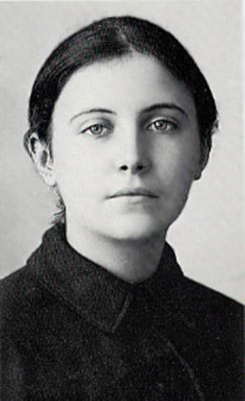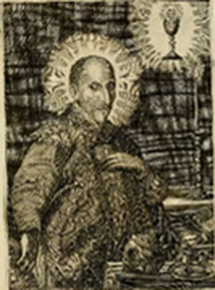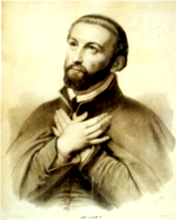The following Saints have Relics on our Altar. St. Gemma Galgani, St. Francis Borgia, St. Francis Xavier, & St. Pius V

St. Gemma Galgani—virgin, stigmatist and visionary was born March 12, 1878 at Borgo Nuovo di Camigliano, Lucca, Tuscany, Italy and died at age 25 on Holy Saturday, April 11, which is now her feast day.
Known as the Flower of Lucca, and often referred to as ‘Daughter of Passion,’ for her intense replication of the Passion of Christ.
She was the daughter of a poor pharmacist; her mother died when she was seven, her father when she was eighteen, and she took care of her seven brothers and sisters. She had immense love for the poor and helped them in any way she could. She refused two marriage proposals because she wanted silence, retirement, and more than ever, she desired to pray and speak only to God.
Throughout her life Gemma was chosen to receive many mystical experiences and special graces. Cured in her 20s of spinal tuberculosis by prayer to St. Gabriel of Our Lady of Sorrows. Rejected by the orders to which she applied who would not believe her cure, she offered her disappointment to God as a sacrifice and became a Passionist tertiary. She was a stigmatist, receiving the wounds on her hands and feet each Thursday evening through Friday afternoon starting in June 1899 and continuing into 1901. Under advisement of her confessor she prayed for the disappearance of the stigmata due to her declining health. Through her prayers the phenonomen stopped however, the white marks where the gashes would appear remained on her skin until her death. She was frequently found in a state of ecstasy and on one occasion believed to have levitated. Her words during her ecstasies were recorded by her confessor and a relative. She saw her guardian angel daily, and also visits from the devil who tempted her to spit on the cross and break a rosary. Her canonization faced stiff opposition by those who either disbelieved or wished to avoid attention to her visions and stigmata. Canonized: 2 May 1940 by Pope Pius XII. Patronage: apothecaries; druggists; loss of parents; pharmacists; temptations.
"If I saw the gates of Hell open and I stood on the brink of the abyss, I should not despair, I should not lose hope of mercy, because I should trust in You, my God." — St. Gemma Galgani
Known as the Flower of Lucca, and often referred to as ‘Daughter of Passion,’ for her intense replication of the Passion of Christ.
She was the daughter of a poor pharmacist; her mother died when she was seven, her father when she was eighteen, and she took care of her seven brothers and sisters. She had immense love for the poor and helped them in any way she could. She refused two marriage proposals because she wanted silence, retirement, and more than ever, she desired to pray and speak only to God.
Throughout her life Gemma was chosen to receive many mystical experiences and special graces. Cured in her 20s of spinal tuberculosis by prayer to St. Gabriel of Our Lady of Sorrows. Rejected by the orders to which she applied who would not believe her cure, she offered her disappointment to God as a sacrifice and became a Passionist tertiary. She was a stigmatist, receiving the wounds on her hands and feet each Thursday evening through Friday afternoon starting in June 1899 and continuing into 1901. Under advisement of her confessor she prayed for the disappearance of the stigmata due to her declining health. Through her prayers the phenonomen stopped however, the white marks where the gashes would appear remained on her skin until her death. She was frequently found in a state of ecstasy and on one occasion believed to have levitated. Her words during her ecstasies were recorded by her confessor and a relative. She saw her guardian angel daily, and also visits from the devil who tempted her to spit on the cross and break a rosary. Her canonization faced stiff opposition by those who either disbelieved or wished to avoid attention to her visions and stigmata. Canonized: 2 May 1940 by Pope Pius XII. Patronage: apothecaries; druggists; loss of parents; pharmacists; temptations.
"If I saw the gates of Hell open and I stood on the brink of the abyss, I should not despair, I should not lose hope of mercy, because I should trust in You, my God." — St. Gemma Galgani

St. Francis Borgia was born in Spain in 1510. Although born into wealth and prominence, this man went on to become a priest and a leader of the Jesuits in Rome.
At the age of 18, St. Francis began a career on the council of Emperor Charles V which spanned 20 years. St. Francis enjoyed much success and was appointed to positions of greater authority and responsibility during his secular life. He became Duke of Gandia after his father’s death and served Prince Philip of Gandia. After retiring from service to the prince, his wife died, leaving him to raise eight children on his own.
These events lead him to question the direction of his life. Five years later when his children were grown, he gave his wealth and his title to his son. He was ordained a Jesuit priest in 1551, though secretly had already taken formal vows as a Jesuit. Although his entry into the priesthood may seem drastic, St. Francis was known throughout his career for being modest, virtuous, and steadfast to Christian ideals. Additionally, he built hospitals, established monasteries, and helped the poor. The “duke turned Jesuit” became the talk of all Spain and he was called to preach in many cities. His example made a deep impression everywhere, and he was responsible for many high-born youths joining the order.
Many attempts to elevate St. Francis to the cardinalate which he did not want and they were ended by St. Ignatius who intervened on St. Francis’ behalf and also by successive popes who loved him too much to cause him distress.
In 1554 St. Francis was appointed head of the Jesuits in Spain by St. Ignatius. After only two years, St. Francis was also given responsibility for missions in the East and West Indies. Every area that he went into was strengthened by his influence and benefited from his initiatives. During this period, he fostered education by starting colleges and schools, and he became chaplain to Charles V on whose council he had served prior to his entry into the priesthood.
In 1565, his previous successes led him to Rome to serve as the General of the Jesuits. There he quickly gained the admiration of the public. Under his generalship the Society established its missions in Florida, New Spain (northwestern Mexico and southern Arizona) and Peru, and greatly developed its internal structures.
His concern that Jesuits were in danger of getting too involved in their work led him to introduce their daily hour-long meditation. Due to his changes and revitalization of the Society, he is sometimes called the “Second Founder of the Society of Jesus.”
He died in 1572, two days after his return to Rome from a visit to Spain. St. Francis Borgia was beatified on November 23, 1624, by Pope Urban VIII, and canonized on June 20, 1670, by Pope Clement X. His feast is October 10. Many Catholics pray to him for protection from earthquakes.
At the age of 18, St. Francis began a career on the council of Emperor Charles V which spanned 20 years. St. Francis enjoyed much success and was appointed to positions of greater authority and responsibility during his secular life. He became Duke of Gandia after his father’s death and served Prince Philip of Gandia. After retiring from service to the prince, his wife died, leaving him to raise eight children on his own.
These events lead him to question the direction of his life. Five years later when his children were grown, he gave his wealth and his title to his son. He was ordained a Jesuit priest in 1551, though secretly had already taken formal vows as a Jesuit. Although his entry into the priesthood may seem drastic, St. Francis was known throughout his career for being modest, virtuous, and steadfast to Christian ideals. Additionally, he built hospitals, established monasteries, and helped the poor. The “duke turned Jesuit” became the talk of all Spain and he was called to preach in many cities. His example made a deep impression everywhere, and he was responsible for many high-born youths joining the order.
Many attempts to elevate St. Francis to the cardinalate which he did not want and they were ended by St. Ignatius who intervened on St. Francis’ behalf and also by successive popes who loved him too much to cause him distress.
In 1554 St. Francis was appointed head of the Jesuits in Spain by St. Ignatius. After only two years, St. Francis was also given responsibility for missions in the East and West Indies. Every area that he went into was strengthened by his influence and benefited from his initiatives. During this period, he fostered education by starting colleges and schools, and he became chaplain to Charles V on whose council he had served prior to his entry into the priesthood.
In 1565, his previous successes led him to Rome to serve as the General of the Jesuits. There he quickly gained the admiration of the public. Under his generalship the Society established its missions in Florida, New Spain (northwestern Mexico and southern Arizona) and Peru, and greatly developed its internal structures.
His concern that Jesuits were in danger of getting too involved in their work led him to introduce their daily hour-long meditation. Due to his changes and revitalization of the Society, he is sometimes called the “Second Founder of the Society of Jesus.”
He died in 1572, two days after his return to Rome from a visit to Spain. St. Francis Borgia was beatified on November 23, 1624, by Pope Urban VIII, and canonized on June 20, 1670, by Pope Clement X. His feast is October 10. Many Catholics pray to him for protection from earthquakes.

St. Francis Xavier, Apostle of the Indies, Confessor
A charge to go and preach to all nations was given by Christ to his apostles. Among those who in the sixteenth century laboured most successfully in this great work, the most illustrious was St. Francis Xavier, the Thaumaturgus of these later ages, whom Urban VIII. justly styled the apostle of the Indies. This great saint was born in Navarre, at the castle of Xavier, eight leagues from Pampelona, in 1506. His mother was heiress of the two illustrious houses of Azpilcueta and Xavier, and his father Don John de Jasso, was one of the chief counsellors of state to John III. d’Albret, king of Navarre. Francis was instructed in the Latin tongue, under domestic masters, and grounded in religious principles by his pious parents. Good natured he discovered a genius and great propensity to learning, to which he turned himself, whilst all his brothers embraced the profession of arms. His parents sent him to Paris at the age of 18; where he entered the college of St. Barbara, and commenced a course of scholastic philosophy. Having studied philosophy two years he proceeded to earn a Master of Arts and then taught philosophy. Holy zeal may properly be said to have formed the character of St. Francis Xavier. Consumed with an insatiable thirst of the salvation of souls, and of the dilatation of the honour and kingdom of Christ on earth, with tears and prayers he asked the Father of all men not to suffer those to perish whom he had created to his own divine image, made capable of knowing and loving him, and redeemed with the adorable blood of his Son; as is set forth in the excellent prayer of this saint, printed in many books of devotion. For this end the saint made himself all to all, and looked upon all fatigues, sufferings, and dangers, as his pleasure and gain. In transports of zeal he invited and pressed others to labour in the conversion of infidels and sinners.
In one of his letters to Europe, he wrote as follows: “I have often thoughts to run over all the universities of Europe, and principally that of Paris, and to cry aloud to those who abound more in learning than in charity. Ah! how many souls are lost to heaven through your neglect!—Many, without doubt, would be moved, would make a spiritual retreat, and give themselves the leisure for meditating on heavenly things. They would renounce their passions, and, trampling under foot all worldly vanities, would put themselves in a condition of following the motions of the divine will. Then they would say: Behold me in readiness, O Lord. How much more happily would these learned men then live! With how much more assurance would they die.—Millions of idolaters might be easily converted, if there were more preachers who would sincerely mind the interests of Jesus Christ, and not their own. But the saint required missionaries who are prudent, charitable, mild, perfectly disinterested, and of so great a purity of manners, that no occasions of sin could weaken their constancy.
A charge to go and preach to all nations was given by Christ to his apostles. Among those who in the sixteenth century laboured most successfully in this great work, the most illustrious was St. Francis Xavier, the Thaumaturgus of these later ages, whom Urban VIII. justly styled the apostle of the Indies. This great saint was born in Navarre, at the castle of Xavier, eight leagues from Pampelona, in 1506. His mother was heiress of the two illustrious houses of Azpilcueta and Xavier, and his father Don John de Jasso, was one of the chief counsellors of state to John III. d’Albret, king of Navarre. Francis was instructed in the Latin tongue, under domestic masters, and grounded in religious principles by his pious parents. Good natured he discovered a genius and great propensity to learning, to which he turned himself, whilst all his brothers embraced the profession of arms. His parents sent him to Paris at the age of 18; where he entered the college of St. Barbara, and commenced a course of scholastic philosophy. Having studied philosophy two years he proceeded to earn a Master of Arts and then taught philosophy. Holy zeal may properly be said to have formed the character of St. Francis Xavier. Consumed with an insatiable thirst of the salvation of souls, and of the dilatation of the honour and kingdom of Christ on earth, with tears and prayers he asked the Father of all men not to suffer those to perish whom he had created to his own divine image, made capable of knowing and loving him, and redeemed with the adorable blood of his Son; as is set forth in the excellent prayer of this saint, printed in many books of devotion. For this end the saint made himself all to all, and looked upon all fatigues, sufferings, and dangers, as his pleasure and gain. In transports of zeal he invited and pressed others to labour in the conversion of infidels and sinners.
In one of his letters to Europe, he wrote as follows: “I have often thoughts to run over all the universities of Europe, and principally that of Paris, and to cry aloud to those who abound more in learning than in charity. Ah! how many souls are lost to heaven through your neglect!—Many, without doubt, would be moved, would make a spiritual retreat, and give themselves the leisure for meditating on heavenly things. They would renounce their passions, and, trampling under foot all worldly vanities, would put themselves in a condition of following the motions of the divine will. Then they would say: Behold me in readiness, O Lord. How much more happily would these learned men then live! With how much more assurance would they die.—Millions of idolaters might be easily converted, if there were more preachers who would sincerely mind the interests of Jesus Christ, and not their own. But the saint required missionaries who are prudent, charitable, mild, perfectly disinterested, and of so great a purity of manners, that no occasions of sin could weaken their constancy.

St. Pius V: MICHAEL GHISLERI, known afterwards by the name of Pius V. was born at Bosco, a little town in the diocess of Tortona, on the 27th of January, 1504. He was descended of a noble Bolognese family, but considerably reduced in its splendour and fortunes. In his tender years the most perfect maxims of piety were instilled into him, and he never swerved in the least from those principles during the whole course of his life. He studied grammar under the care of the Dominican friars at Voghera; and giving himself up entirely to the most fervent exercises of religion, took the habit of that Order when he was only fifteen years of age. He was sensible that faint and languishing endeavours never deserve to find the inestimable treasure of true virtue, which they undervalue; they are sure to lose ground, and at length to yield under the repeated assaults of the enemy: whereas fervour breaks down all obstacles in the pursuit of perfection, as so many shadows, and courageously marches on, reckoning all labours the sweetest pleasures, and esteeming as nothing whatever leads not to this great end. Pope Pius IV. after a tedious illness, expired in the arms of St. Charles Borromeo, on the 9th of December, 1565, having filled the chair almost six years. St. Charles, when he saw that the pious cardinal Sirlet, who was first proposed, could not be chosen, united the suffrages of the conclave in favour of our saint, testifying an entire confidence in his virtue. All others applauded the choice, except the pope elect; who, having in vain opposed it by tears and entreaties, at length, for fear of resisting the call of God, gave his consent, on the 7th of January, 1566, and took the name of Pius V.
The greatest danger in a public elevated station is, as St. Bernard pathetically put his disciple, whom he saw raised to the popedom, in mind of, lest, in the hurry of external concerns, we should forget to give sufficient attention to those of our own souls, and lose ourselves in the wilderness or tumult of distracting thoughts and employments. But those who have their whole time at their own disposal, yet have their eyes always abroad, and live, as it were, without themselves, are truly foolish. Every one’s first and principal business is included within himself, in his own heart. It is so deep, that we shall always find in it exercise enough, and shall never be able to sound it: only he, who tries the thoughts and reins, can thoroughly know it. What have we to do to concern ourselves so much with the wars of states, and the quarrels of private persons? But it is infinitely both our duty and our interest to take cognizance of the contests between the flesh and the spirit within our own breasts: to appease this intestine war, by teaching the flesh to be in subjection, placing reason on its throne, and making God reign sovereignly in our hearts. It is not so slight a task as men generally seem to imagine, to keep our domestic kingdom in good order, and to govern wisely and holily those numerous people which are contained in this little state, that is to say, that multitude of affections, thoughts, opinions and passions which easily raise tumults in our hearts. Those who are charged with the care of others, are obliged to reserve to themselves leisure for pious meditation, prayer, and self-examination, and diligently to watch over their own souls. “He who is bad to himself, to whom will he be good?”
The greatest danger in a public elevated station is, as St. Bernard pathetically put his disciple, whom he saw raised to the popedom, in mind of, lest, in the hurry of external concerns, we should forget to give sufficient attention to those of our own souls, and lose ourselves in the wilderness or tumult of distracting thoughts and employments. But those who have their whole time at their own disposal, yet have their eyes always abroad, and live, as it were, without themselves, are truly foolish. Every one’s first and principal business is included within himself, in his own heart. It is so deep, that we shall always find in it exercise enough, and shall never be able to sound it: only he, who tries the thoughts and reins, can thoroughly know it. What have we to do to concern ourselves so much with the wars of states, and the quarrels of private persons? But it is infinitely both our duty and our interest to take cognizance of the contests between the flesh and the spirit within our own breasts: to appease this intestine war, by teaching the flesh to be in subjection, placing reason on its throne, and making God reign sovereignly in our hearts. It is not so slight a task as men generally seem to imagine, to keep our domestic kingdom in good order, and to govern wisely and holily those numerous people which are contained in this little state, that is to say, that multitude of affections, thoughts, opinions and passions which easily raise tumults in our hearts. Those who are charged with the care of others, are obliged to reserve to themselves leisure for pious meditation, prayer, and self-examination, and diligently to watch over their own souls. “He who is bad to himself, to whom will he be good?”